Investigations Principle: A Discussion on Ethical Standards in Investigative Interviewing
VerifiedAdded on 2023/06/12
|11
|2853
|110
AI Summary
This article discusses the importance of ethical standards in investigative interviewing and the different techniques used in the process. It highlights the shift from coercive techniques to more ethical approaches like the P.E.A.C.E model. The article also explains the stages of the P.E.A.C.E model and the core skills required for conducting interviews.
Contribute Materials
Your contribution can guide someone’s learning journey. Share your
documents today.
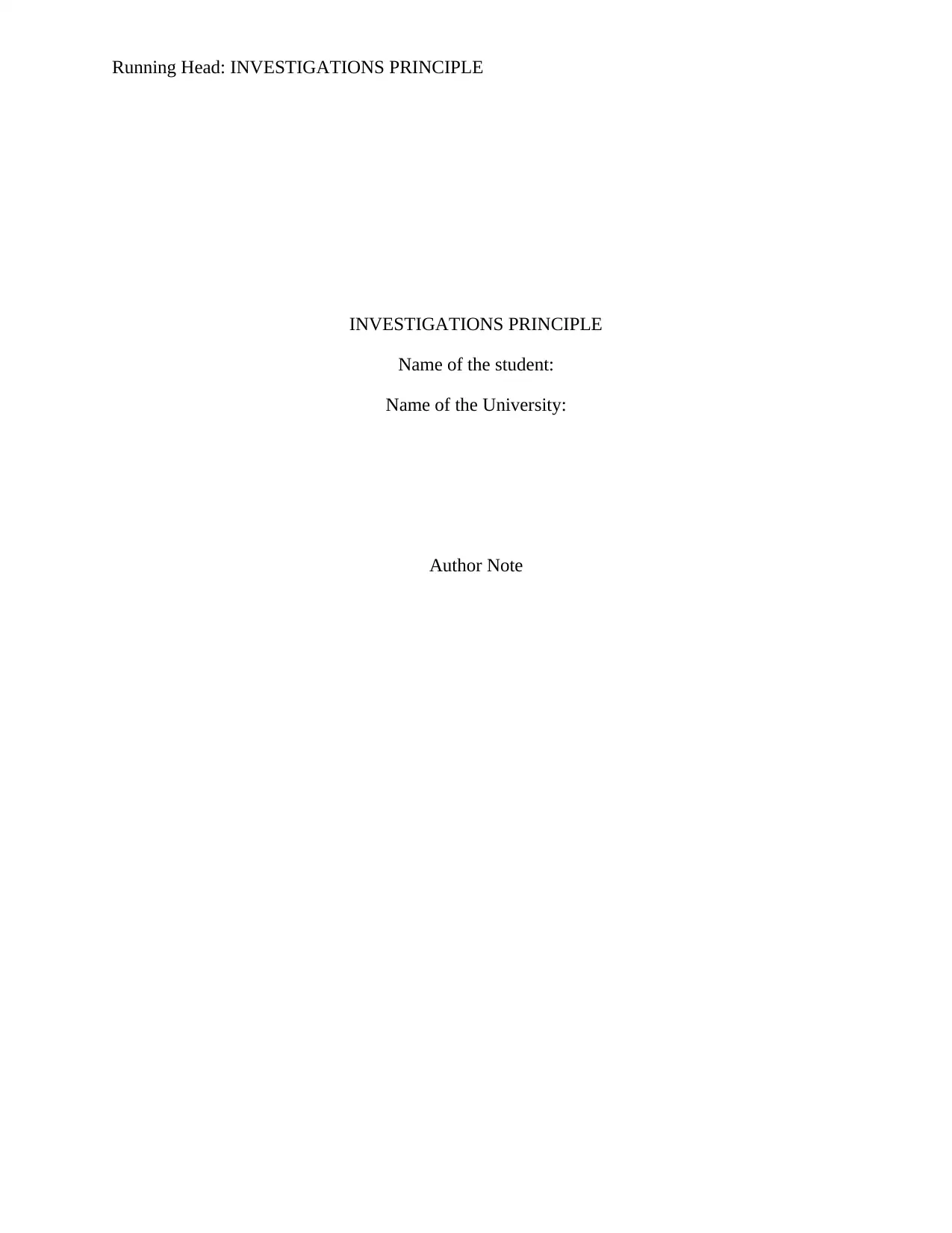
Running Head: INVESTIGATIONS PRINCIPLE
INVESTIGATIONS PRINCIPLE
Name of the student:
Name of the University:
Author Note
INVESTIGATIONS PRINCIPLE
Name of the student:
Name of the University:
Author Note
Secure Best Marks with AI Grader
Need help grading? Try our AI Grader for instant feedback on your assignments.
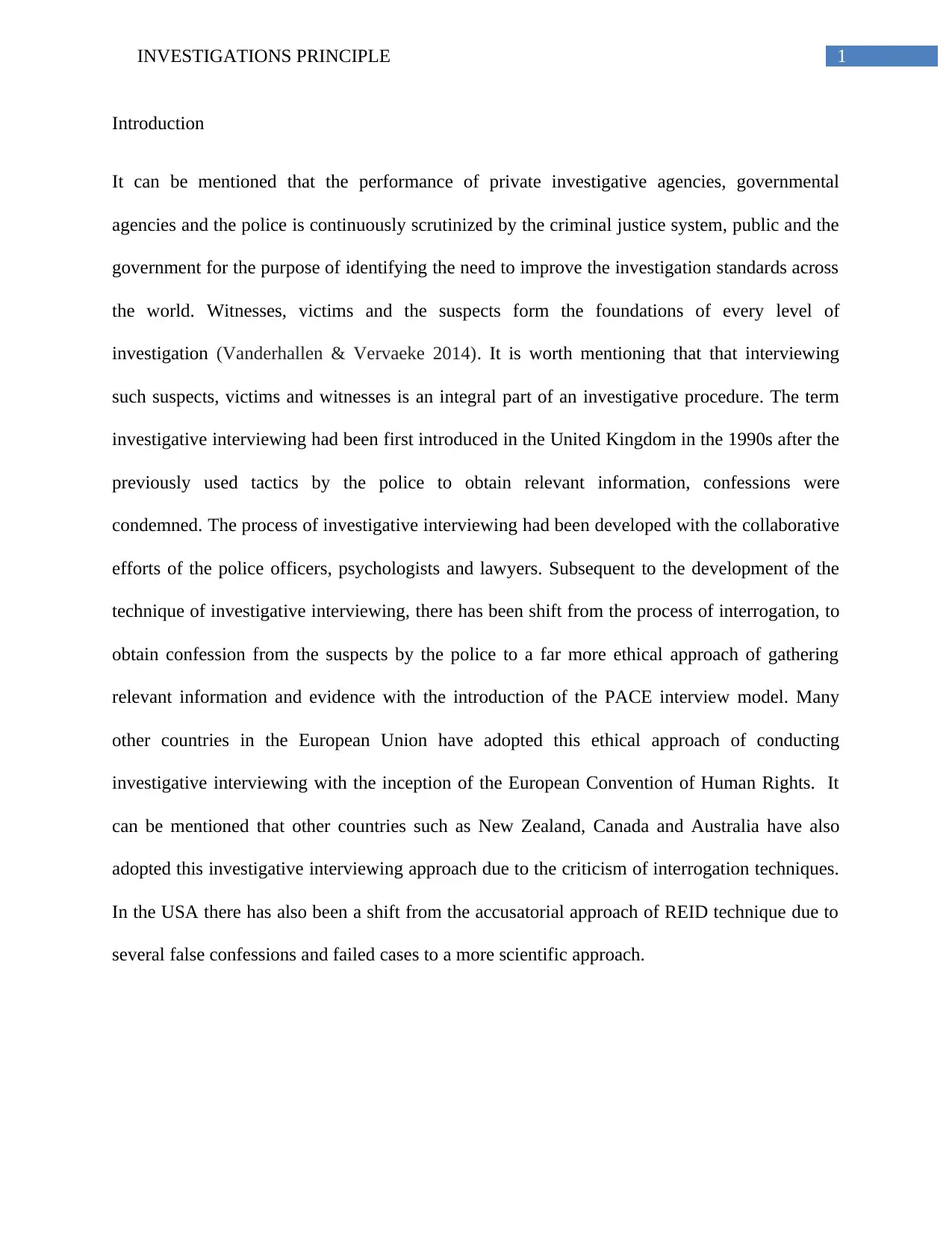
1INVESTIGATIONS PRINCIPLE
Introduction
It can be mentioned that the performance of private investigative agencies, governmental
agencies and the police is continuously scrutinized by the criminal justice system, public and the
government for the purpose of identifying the need to improve the investigation standards across
the world. Witnesses, victims and the suspects form the foundations of every level of
investigation (Vanderhallen & Vervaeke 2014). It is worth mentioning that that interviewing
such suspects, victims and witnesses is an integral part of an investigative procedure. The term
investigative interviewing had been first introduced in the United Kingdom in the 1990s after the
previously used tactics by the police to obtain relevant information, confessions were
condemned. The process of investigative interviewing had been developed with the collaborative
efforts of the police officers, psychologists and lawyers. Subsequent to the development of the
technique of investigative interviewing, there has been shift from the process of interrogation, to
obtain confession from the suspects by the police to a far more ethical approach of gathering
relevant information and evidence with the introduction of the PACE interview model. Many
other countries in the European Union have adopted this ethical approach of conducting
investigative interviewing with the inception of the European Convention of Human Rights. It
can be mentioned that other countries such as New Zealand, Canada and Australia have also
adopted this investigative interviewing approach due to the criticism of interrogation techniques.
In the USA there has also been a shift from the accusatorial approach of REID technique due to
several false confessions and failed cases to a more scientific approach.
Introduction
It can be mentioned that the performance of private investigative agencies, governmental
agencies and the police is continuously scrutinized by the criminal justice system, public and the
government for the purpose of identifying the need to improve the investigation standards across
the world. Witnesses, victims and the suspects form the foundations of every level of
investigation (Vanderhallen & Vervaeke 2014). It is worth mentioning that that interviewing
such suspects, victims and witnesses is an integral part of an investigative procedure. The term
investigative interviewing had been first introduced in the United Kingdom in the 1990s after the
previously used tactics by the police to obtain relevant information, confessions were
condemned. The process of investigative interviewing had been developed with the collaborative
efforts of the police officers, psychologists and lawyers. Subsequent to the development of the
technique of investigative interviewing, there has been shift from the process of interrogation, to
obtain confession from the suspects by the police to a far more ethical approach of gathering
relevant information and evidence with the introduction of the PACE interview model. Many
other countries in the European Union have adopted this ethical approach of conducting
investigative interviewing with the inception of the European Convention of Human Rights. It
can be mentioned that other countries such as New Zealand, Canada and Australia have also
adopted this investigative interviewing approach due to the criticism of interrogation techniques.
In the USA there has also been a shift from the accusatorial approach of REID technique due to
several false confessions and failed cases to a more scientific approach.
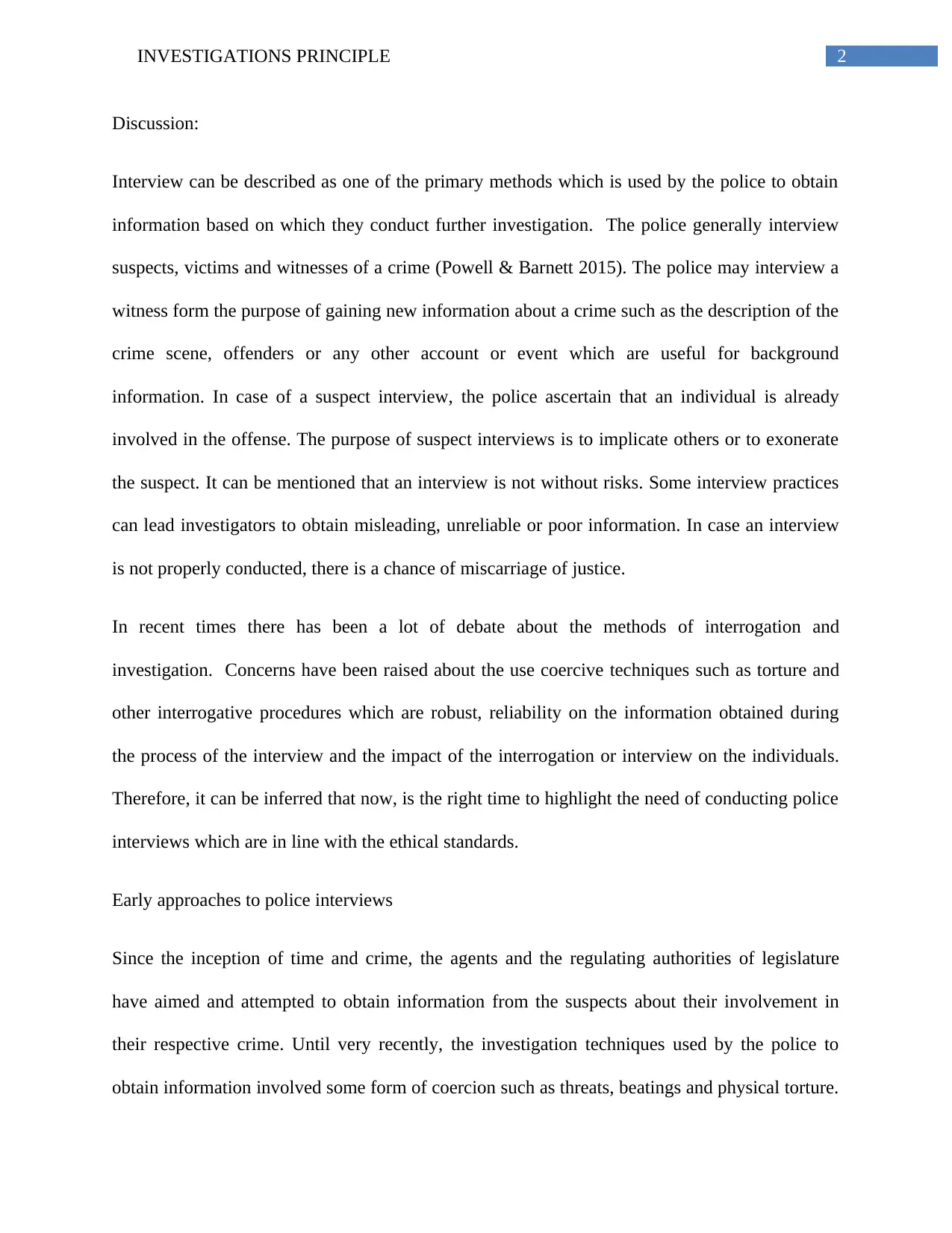
2INVESTIGATIONS PRINCIPLE
Discussion:
Interview can be described as one of the primary methods which is used by the police to obtain
information based on which they conduct further investigation. The police generally interview
suspects, victims and witnesses of a crime (Powell & Barnett 2015). The police may interview a
witness form the purpose of gaining new information about a crime such as the description of the
crime scene, offenders or any other account or event which are useful for background
information. In case of a suspect interview, the police ascertain that an individual is already
involved in the offense. The purpose of suspect interviews is to implicate others or to exonerate
the suspect. It can be mentioned that an interview is not without risks. Some interview practices
can lead investigators to obtain misleading, unreliable or poor information. In case an interview
is not properly conducted, there is a chance of miscarriage of justice.
In recent times there has been a lot of debate about the methods of interrogation and
investigation. Concerns have been raised about the use coercive techniques such as torture and
other interrogative procedures which are robust, reliability on the information obtained during
the process of the interview and the impact of the interrogation or interview on the individuals.
Therefore, it can be inferred that now, is the right time to highlight the need of conducting police
interviews which are in line with the ethical standards.
Early approaches to police interviews
Since the inception of time and crime, the agents and the regulating authorities of legislature
have aimed and attempted to obtain information from the suspects about their involvement in
their respective crime. Until very recently, the investigation techniques used by the police to
obtain information involved some form of coercion such as threats, beatings and physical torture.
Discussion:
Interview can be described as one of the primary methods which is used by the police to obtain
information based on which they conduct further investigation. The police generally interview
suspects, victims and witnesses of a crime (Powell & Barnett 2015). The police may interview a
witness form the purpose of gaining new information about a crime such as the description of the
crime scene, offenders or any other account or event which are useful for background
information. In case of a suspect interview, the police ascertain that an individual is already
involved in the offense. The purpose of suspect interviews is to implicate others or to exonerate
the suspect. It can be mentioned that an interview is not without risks. Some interview practices
can lead investigators to obtain misleading, unreliable or poor information. In case an interview
is not properly conducted, there is a chance of miscarriage of justice.
In recent times there has been a lot of debate about the methods of interrogation and
investigation. Concerns have been raised about the use coercive techniques such as torture and
other interrogative procedures which are robust, reliability on the information obtained during
the process of the interview and the impact of the interrogation or interview on the individuals.
Therefore, it can be inferred that now, is the right time to highlight the need of conducting police
interviews which are in line with the ethical standards.
Early approaches to police interviews
Since the inception of time and crime, the agents and the regulating authorities of legislature
have aimed and attempted to obtain information from the suspects about their involvement in
their respective crime. Until very recently, the investigation techniques used by the police to
obtain information involved some form of coercion such as threats, beatings and physical torture.
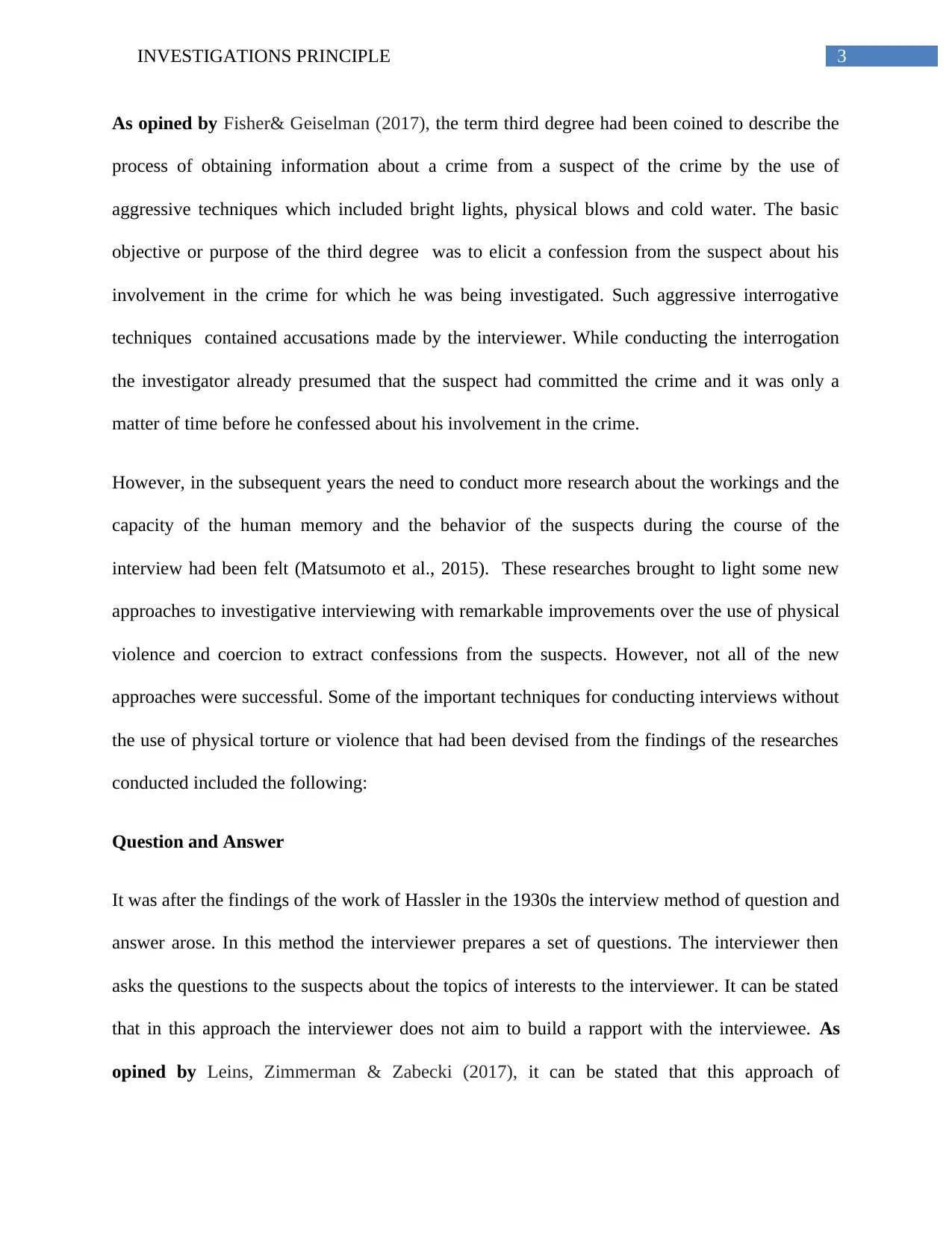
3INVESTIGATIONS PRINCIPLE
As opined by Fisher& Geiselman (2017), the term third degree had been coined to describe the
process of obtaining information about a crime from a suspect of the crime by the use of
aggressive techniques which included bright lights, physical blows and cold water. The basic
objective or purpose of the third degree was to elicit a confession from the suspect about his
involvement in the crime for which he was being investigated. Such aggressive interrogative
techniques contained accusations made by the interviewer. While conducting the interrogation
the investigator already presumed that the suspect had committed the crime and it was only a
matter of time before he confessed about his involvement in the crime.
However, in the subsequent years the need to conduct more research about the workings and the
capacity of the human memory and the behavior of the suspects during the course of the
interview had been felt (Matsumoto et al., 2015). These researches brought to light some new
approaches to investigative interviewing with remarkable improvements over the use of physical
violence and coercion to extract confessions from the suspects. However, not all of the new
approaches were successful. Some of the important techniques for conducting interviews without
the use of physical torture or violence that had been devised from the findings of the researches
conducted included the following:
Question and Answer
It was after the findings of the work of Hassler in the 1930s the interview method of question and
answer arose. In this method the interviewer prepares a set of questions. The interviewer then
asks the questions to the suspects about the topics of interests to the interviewer. It can be stated
that in this approach the interviewer does not aim to build a rapport with the interviewee. As
opined by Leins, Zimmerman & Zabecki (2017), it can be stated that this approach of
As opined by Fisher& Geiselman (2017), the term third degree had been coined to describe the
process of obtaining information about a crime from a suspect of the crime by the use of
aggressive techniques which included bright lights, physical blows and cold water. The basic
objective or purpose of the third degree was to elicit a confession from the suspect about his
involvement in the crime for which he was being investigated. Such aggressive interrogative
techniques contained accusations made by the interviewer. While conducting the interrogation
the investigator already presumed that the suspect had committed the crime and it was only a
matter of time before he confessed about his involvement in the crime.
However, in the subsequent years the need to conduct more research about the workings and the
capacity of the human memory and the behavior of the suspects during the course of the
interview had been felt (Matsumoto et al., 2015). These researches brought to light some new
approaches to investigative interviewing with remarkable improvements over the use of physical
violence and coercion to extract confessions from the suspects. However, not all of the new
approaches were successful. Some of the important techniques for conducting interviews without
the use of physical torture or violence that had been devised from the findings of the researches
conducted included the following:
Question and Answer
It was after the findings of the work of Hassler in the 1930s the interview method of question and
answer arose. In this method the interviewer prepares a set of questions. The interviewer then
asks the questions to the suspects about the topics of interests to the interviewer. It can be stated
that in this approach the interviewer does not aim to build a rapport with the interviewee. As
opined by Leins, Zimmerman & Zabecki (2017), it can be stated that this approach of
Secure Best Marks with AI Grader
Need help grading? Try our AI Grader for instant feedback on your assignments.
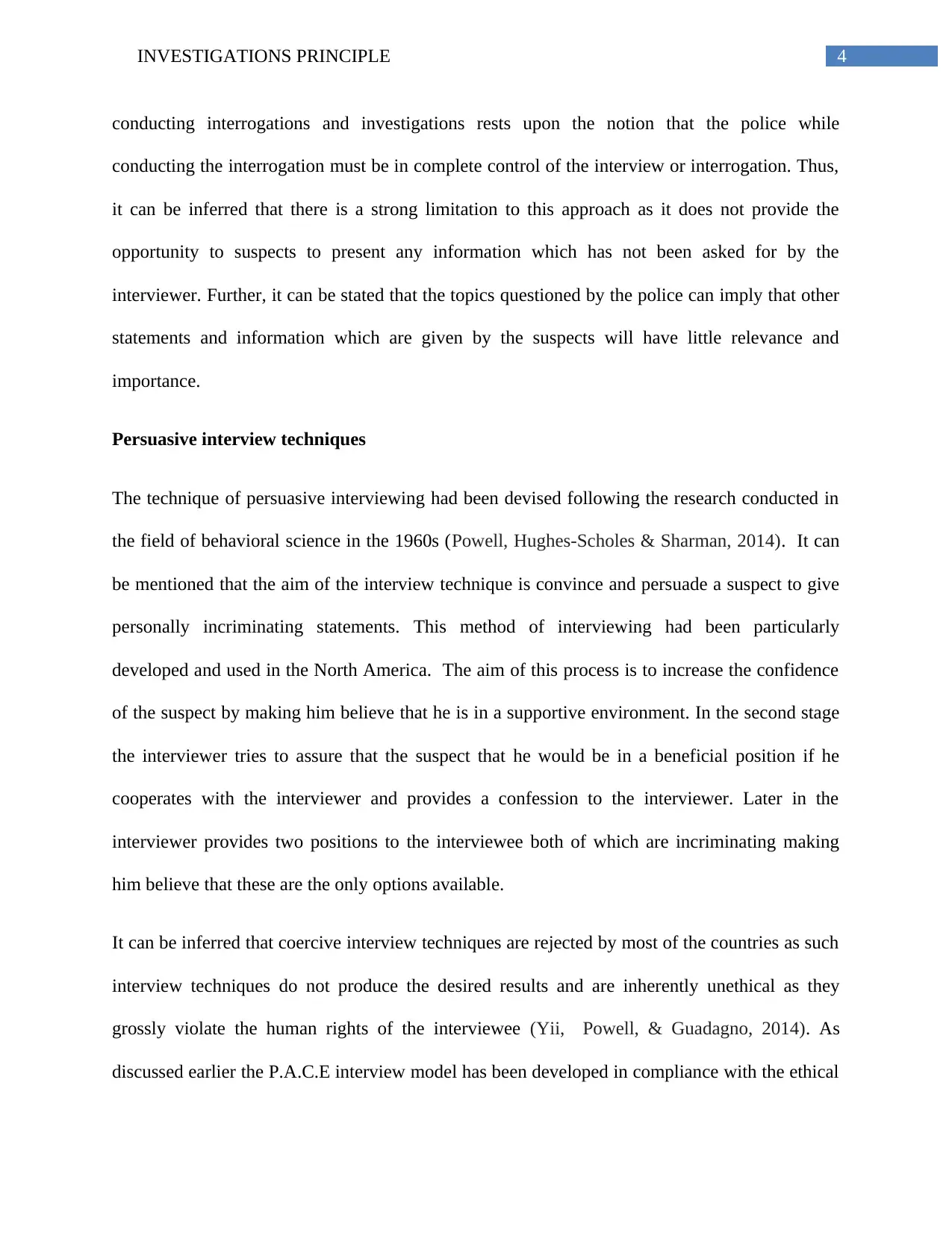
4INVESTIGATIONS PRINCIPLE
conducting interrogations and investigations rests upon the notion that the police while
conducting the interrogation must be in complete control of the interview or interrogation. Thus,
it can be inferred that there is a strong limitation to this approach as it does not provide the
opportunity to suspects to present any information which has not been asked for by the
interviewer. Further, it can be stated that the topics questioned by the police can imply that other
statements and information which are given by the suspects will have little relevance and
importance.
Persuasive interview techniques
The technique of persuasive interviewing had been devised following the research conducted in
the field of behavioral science in the 1960s (Powell, Hughes-Scholes & Sharman, 2014). It can
be mentioned that the aim of the interview technique is convince and persuade a suspect to give
personally incriminating statements. This method of interviewing had been particularly
developed and used in the North America. The aim of this process is to increase the confidence
of the suspect by making him believe that he is in a supportive environment. In the second stage
the interviewer tries to assure that the suspect that he would be in a beneficial position if he
cooperates with the interviewer and provides a confession to the interviewer. Later in the
interviewer provides two positions to the interviewee both of which are incriminating making
him believe that these are the only options available.
It can be inferred that coercive interview techniques are rejected by most of the countries as such
interview techniques do not produce the desired results and are inherently unethical as they
grossly violate the human rights of the interviewee (Yii, Powell, & Guadagno, 2014). As
discussed earlier the P.A.C.E interview model has been developed in compliance with the ethical
conducting interrogations and investigations rests upon the notion that the police while
conducting the interrogation must be in complete control of the interview or interrogation. Thus,
it can be inferred that there is a strong limitation to this approach as it does not provide the
opportunity to suspects to present any information which has not been asked for by the
interviewer. Further, it can be stated that the topics questioned by the police can imply that other
statements and information which are given by the suspects will have little relevance and
importance.
Persuasive interview techniques
The technique of persuasive interviewing had been devised following the research conducted in
the field of behavioral science in the 1960s (Powell, Hughes-Scholes & Sharman, 2014). It can
be mentioned that the aim of the interview technique is convince and persuade a suspect to give
personally incriminating statements. This method of interviewing had been particularly
developed and used in the North America. The aim of this process is to increase the confidence
of the suspect by making him believe that he is in a supportive environment. In the second stage
the interviewer tries to assure that the suspect that he would be in a beneficial position if he
cooperates with the interviewer and provides a confession to the interviewer. Later in the
interviewer provides two positions to the interviewee both of which are incriminating making
him believe that these are the only options available.
It can be inferred that coercive interview techniques are rejected by most of the countries as such
interview techniques do not produce the desired results and are inherently unethical as they
grossly violate the human rights of the interviewee (Yii, Powell, & Guadagno, 2014). As
discussed earlier the P.A.C.E interview model has been developed in compliance with the ethical
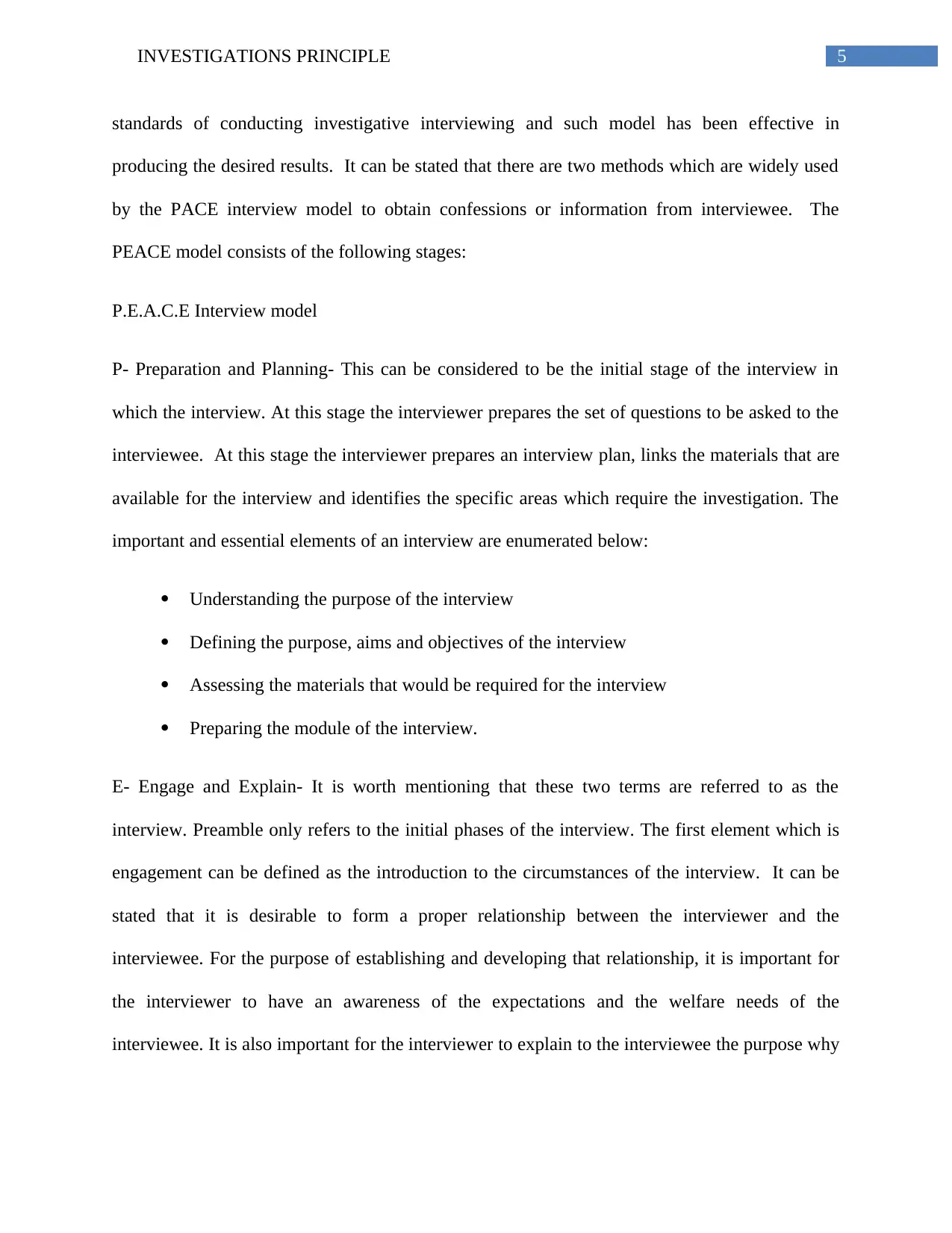
5INVESTIGATIONS PRINCIPLE
standards of conducting investigative interviewing and such model has been effective in
producing the desired results. It can be stated that there are two methods which are widely used
by the PACE interview model to obtain confessions or information from interviewee. The
PEACE model consists of the following stages:
P.E.A.C.E Interview model
P- Preparation and Planning- This can be considered to be the initial stage of the interview in
which the interview. At this stage the interviewer prepares the set of questions to be asked to the
interviewee. At this stage the interviewer prepares an interview plan, links the materials that are
available for the interview and identifies the specific areas which require the investigation. The
important and essential elements of an interview are enumerated below:
Understanding the purpose of the interview
Defining the purpose, aims and objectives of the interview
Assessing the materials that would be required for the interview
Preparing the module of the interview.
E- Engage and Explain- It is worth mentioning that these two terms are referred to as the
interview. Preamble only refers to the initial phases of the interview. The first element which is
engagement can be defined as the introduction to the circumstances of the interview. It can be
stated that it is desirable to form a proper relationship between the interviewer and the
interviewee. For the purpose of establishing and developing that relationship, it is important for
the interviewer to have an awareness of the expectations and the welfare needs of the
interviewee. It is also important for the interviewer to explain to the interviewee the purpose why
standards of conducting investigative interviewing and such model has been effective in
producing the desired results. It can be stated that there are two methods which are widely used
by the PACE interview model to obtain confessions or information from interviewee. The
PEACE model consists of the following stages:
P.E.A.C.E Interview model
P- Preparation and Planning- This can be considered to be the initial stage of the interview in
which the interview. At this stage the interviewer prepares the set of questions to be asked to the
interviewee. At this stage the interviewer prepares an interview plan, links the materials that are
available for the interview and identifies the specific areas which require the investigation. The
important and essential elements of an interview are enumerated below:
Understanding the purpose of the interview
Defining the purpose, aims and objectives of the interview
Assessing the materials that would be required for the interview
Preparing the module of the interview.
E- Engage and Explain- It is worth mentioning that these two terms are referred to as the
interview. Preamble only refers to the initial phases of the interview. The first element which is
engagement can be defined as the introduction to the circumstances of the interview. It can be
stated that it is desirable to form a proper relationship between the interviewer and the
interviewee. For the purpose of establishing and developing that relationship, it is important for
the interviewer to have an awareness of the expectations and the welfare needs of the
interviewee. It is also important for the interviewer to explain to the interviewee the purpose why
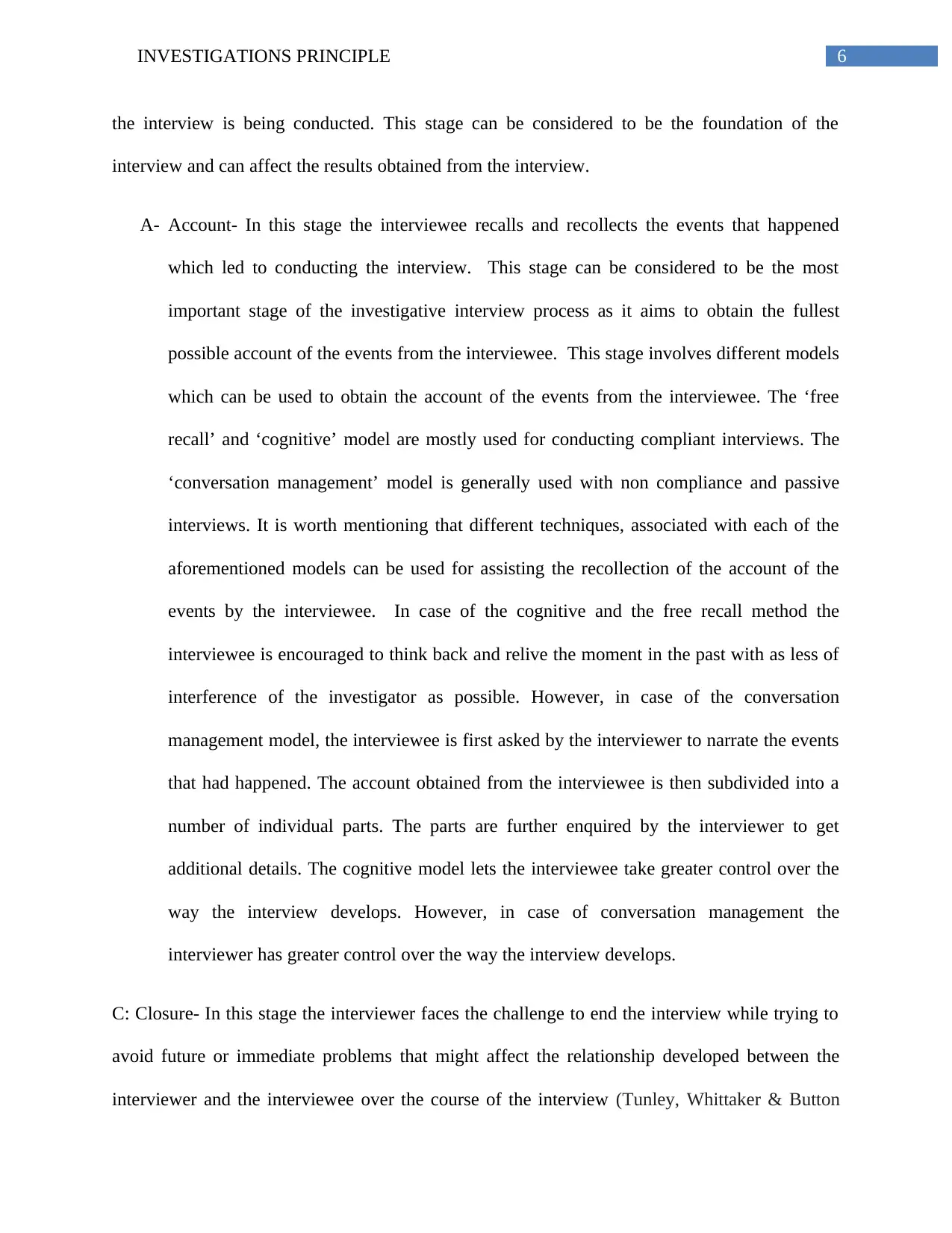
6INVESTIGATIONS PRINCIPLE
the interview is being conducted. This stage can be considered to be the foundation of the
interview and can affect the results obtained from the interview.
A- Account- In this stage the interviewee recalls and recollects the events that happened
which led to conducting the interview. This stage can be considered to be the most
important stage of the investigative interview process as it aims to obtain the fullest
possible account of the events from the interviewee. This stage involves different models
which can be used to obtain the account of the events from the interviewee. The ‘free
recall’ and ‘cognitive’ model are mostly used for conducting compliant interviews. The
‘conversation management’ model is generally used with non compliance and passive
interviews. It is worth mentioning that different techniques, associated with each of the
aforementioned models can be used for assisting the recollection of the account of the
events by the interviewee. In case of the cognitive and the free recall method the
interviewee is encouraged to think back and relive the moment in the past with as less of
interference of the investigator as possible. However, in case of the conversation
management model, the interviewee is first asked by the interviewer to narrate the events
that had happened. The account obtained from the interviewee is then subdivided into a
number of individual parts. The parts are further enquired by the interviewer to get
additional details. The cognitive model lets the interviewee take greater control over the
way the interview develops. However, in case of conversation management the
interviewer has greater control over the way the interview develops.
C: Closure- In this stage the interviewer faces the challenge to end the interview while trying to
avoid future or immediate problems that might affect the relationship developed between the
interviewer and the interviewee over the course of the interview (Tunley, Whittaker & Button
the interview is being conducted. This stage can be considered to be the foundation of the
interview and can affect the results obtained from the interview.
A- Account- In this stage the interviewee recalls and recollects the events that happened
which led to conducting the interview. This stage can be considered to be the most
important stage of the investigative interview process as it aims to obtain the fullest
possible account of the events from the interviewee. This stage involves different models
which can be used to obtain the account of the events from the interviewee. The ‘free
recall’ and ‘cognitive’ model are mostly used for conducting compliant interviews. The
‘conversation management’ model is generally used with non compliance and passive
interviews. It is worth mentioning that different techniques, associated with each of the
aforementioned models can be used for assisting the recollection of the account of the
events by the interviewee. In case of the cognitive and the free recall method the
interviewee is encouraged to think back and relive the moment in the past with as less of
interference of the investigator as possible. However, in case of the conversation
management model, the interviewee is first asked by the interviewer to narrate the events
that had happened. The account obtained from the interviewee is then subdivided into a
number of individual parts. The parts are further enquired by the interviewer to get
additional details. The cognitive model lets the interviewee take greater control over the
way the interview develops. However, in case of conversation management the
interviewer has greater control over the way the interview develops.
C: Closure- In this stage the interviewer faces the challenge to end the interview while trying to
avoid future or immediate problems that might affect the relationship developed between the
interviewer and the interviewee over the course of the interview (Tunley, Whittaker & Button
Paraphrase This Document
Need a fresh take? Get an instant paraphrase of this document with our AI Paraphraser
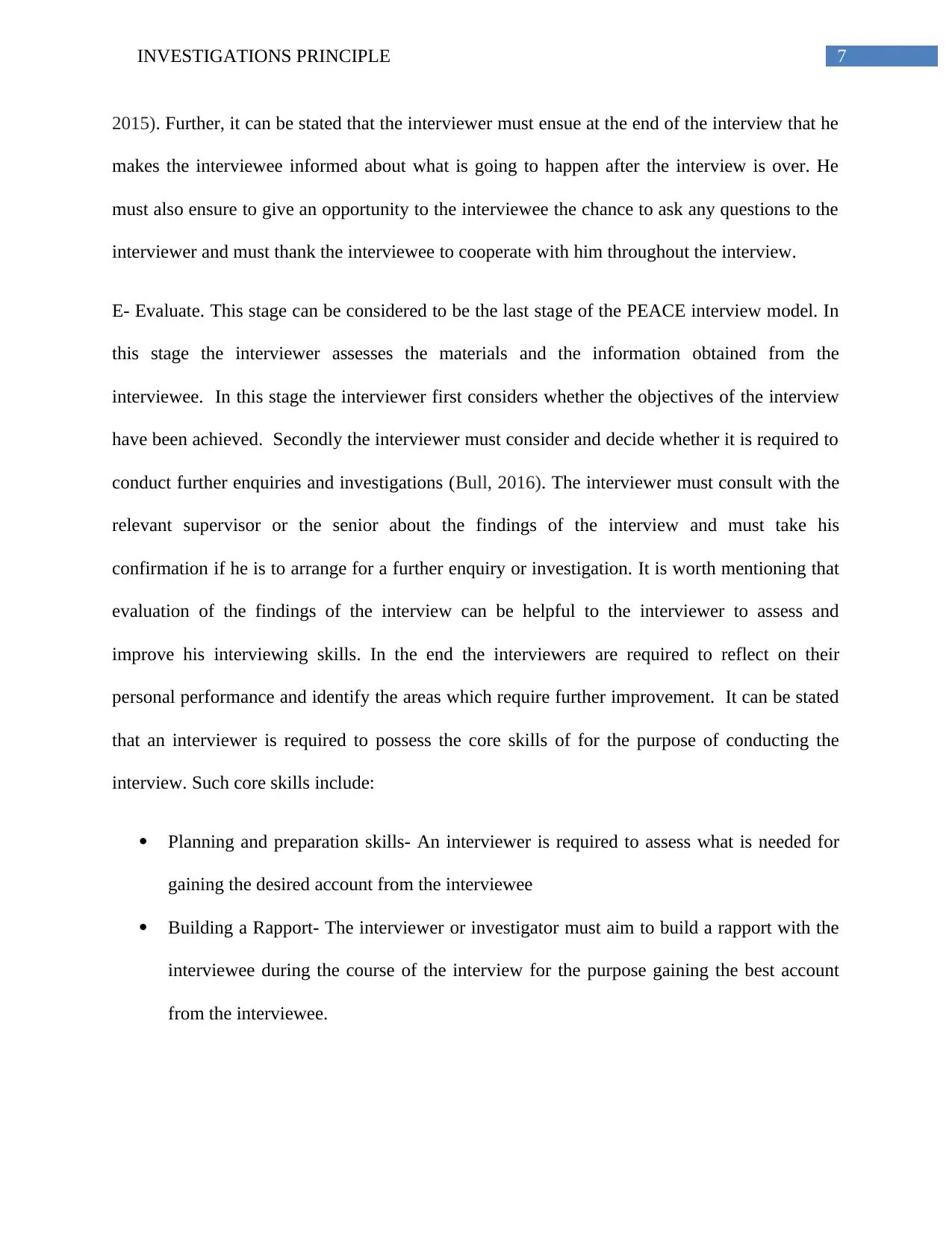
7INVESTIGATIONS PRINCIPLE
2015). Further, it can be stated that the interviewer must ensue at the end of the interview that he
makes the interviewee informed about what is going to happen after the interview is over. He
must also ensure to give an opportunity to the interviewee the chance to ask any questions to the
interviewer and must thank the interviewee to cooperate with him throughout the interview.
E- Evaluate. This stage can be considered to be the last stage of the PEACE interview model. In
this stage the interviewer assesses the materials and the information obtained from the
interviewee. In this stage the interviewer first considers whether the objectives of the interview
have been achieved. Secondly the interviewer must consider and decide whether it is required to
conduct further enquiries and investigations (Bull, 2016). The interviewer must consult with the
relevant supervisor or the senior about the findings of the interview and must take his
confirmation if he is to arrange for a further enquiry or investigation. It is worth mentioning that
evaluation of the findings of the interview can be helpful to the interviewer to assess and
improve his interviewing skills. In the end the interviewers are required to reflect on their
personal performance and identify the areas which require further improvement. It can be stated
that an interviewer is required to possess the core skills of for the purpose of conducting the
interview. Such core skills include:
Planning and preparation skills- An interviewer is required to assess what is needed for
gaining the desired account from the interviewee
Building a Rapport- The interviewer or investigator must aim to build a rapport with the
interviewee during the course of the interview for the purpose gaining the best account
from the interviewee.
2015). Further, it can be stated that the interviewer must ensue at the end of the interview that he
makes the interviewee informed about what is going to happen after the interview is over. He
must also ensure to give an opportunity to the interviewee the chance to ask any questions to the
interviewer and must thank the interviewee to cooperate with him throughout the interview.
E- Evaluate. This stage can be considered to be the last stage of the PEACE interview model. In
this stage the interviewer assesses the materials and the information obtained from the
interviewee. In this stage the interviewer first considers whether the objectives of the interview
have been achieved. Secondly the interviewer must consider and decide whether it is required to
conduct further enquiries and investigations (Bull, 2016). The interviewer must consult with the
relevant supervisor or the senior about the findings of the interview and must take his
confirmation if he is to arrange for a further enquiry or investigation. It is worth mentioning that
evaluation of the findings of the interview can be helpful to the interviewer to assess and
improve his interviewing skills. In the end the interviewers are required to reflect on their
personal performance and identify the areas which require further improvement. It can be stated
that an interviewer is required to possess the core skills of for the purpose of conducting the
interview. Such core skills include:
Planning and preparation skills- An interviewer is required to assess what is needed for
gaining the desired account from the interviewee
Building a Rapport- The interviewer or investigator must aim to build a rapport with the
interviewee during the course of the interview for the purpose gaining the best account
from the interviewee.
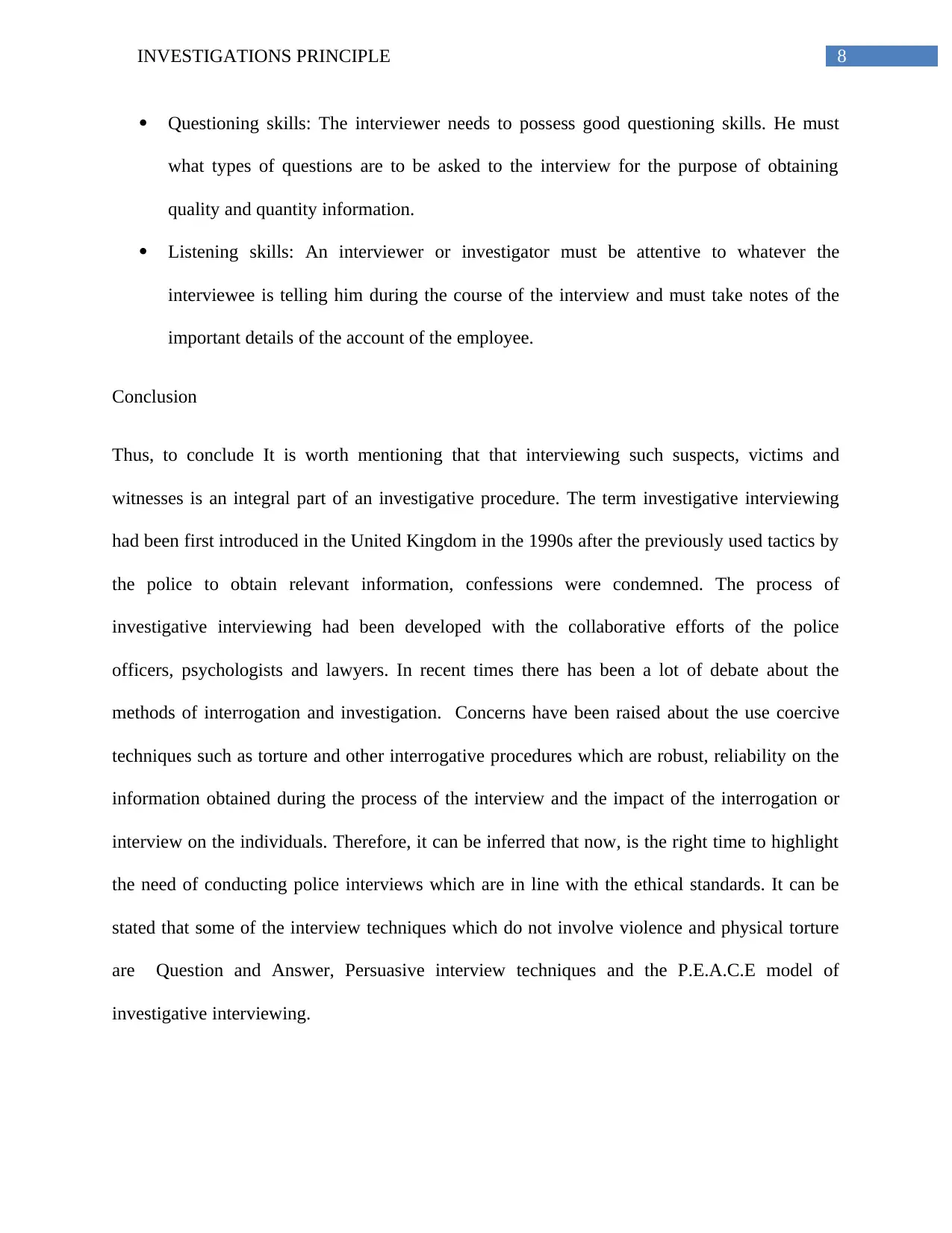
8INVESTIGATIONS PRINCIPLE
Questioning skills: The interviewer needs to possess good questioning skills. He must
what types of questions are to be asked to the interview for the purpose of obtaining
quality and quantity information.
Listening skills: An interviewer or investigator must be attentive to whatever the
interviewee is telling him during the course of the interview and must take notes of the
important details of the account of the employee.
Conclusion
Thus, to conclude It is worth mentioning that that interviewing such suspects, victims and
witnesses is an integral part of an investigative procedure. The term investigative interviewing
had been first introduced in the United Kingdom in the 1990s after the previously used tactics by
the police to obtain relevant information, confessions were condemned. The process of
investigative interviewing had been developed with the collaborative efforts of the police
officers, psychologists and lawyers. In recent times there has been a lot of debate about the
methods of interrogation and investigation. Concerns have been raised about the use coercive
techniques such as torture and other interrogative procedures which are robust, reliability on the
information obtained during the process of the interview and the impact of the interrogation or
interview on the individuals. Therefore, it can be inferred that now, is the right time to highlight
the need of conducting police interviews which are in line with the ethical standards. It can be
stated that some of the interview techniques which do not involve violence and physical torture
are Question and Answer, Persuasive interview techniques and the P.E.A.C.E model of
investigative interviewing.
Questioning skills: The interviewer needs to possess good questioning skills. He must
what types of questions are to be asked to the interview for the purpose of obtaining
quality and quantity information.
Listening skills: An interviewer or investigator must be attentive to whatever the
interviewee is telling him during the course of the interview and must take notes of the
important details of the account of the employee.
Conclusion
Thus, to conclude It is worth mentioning that that interviewing such suspects, victims and
witnesses is an integral part of an investigative procedure. The term investigative interviewing
had been first introduced in the United Kingdom in the 1990s after the previously used tactics by
the police to obtain relevant information, confessions were condemned. The process of
investigative interviewing had been developed with the collaborative efforts of the police
officers, psychologists and lawyers. In recent times there has been a lot of debate about the
methods of interrogation and investigation. Concerns have been raised about the use coercive
techniques such as torture and other interrogative procedures which are robust, reliability on the
information obtained during the process of the interview and the impact of the interrogation or
interview on the individuals. Therefore, it can be inferred that now, is the right time to highlight
the need of conducting police interviews which are in line with the ethical standards. It can be
stated that some of the interview techniques which do not involve violence and physical torture
are Question and Answer, Persuasive interview techniques and the P.E.A.C.E model of
investigative interviewing.
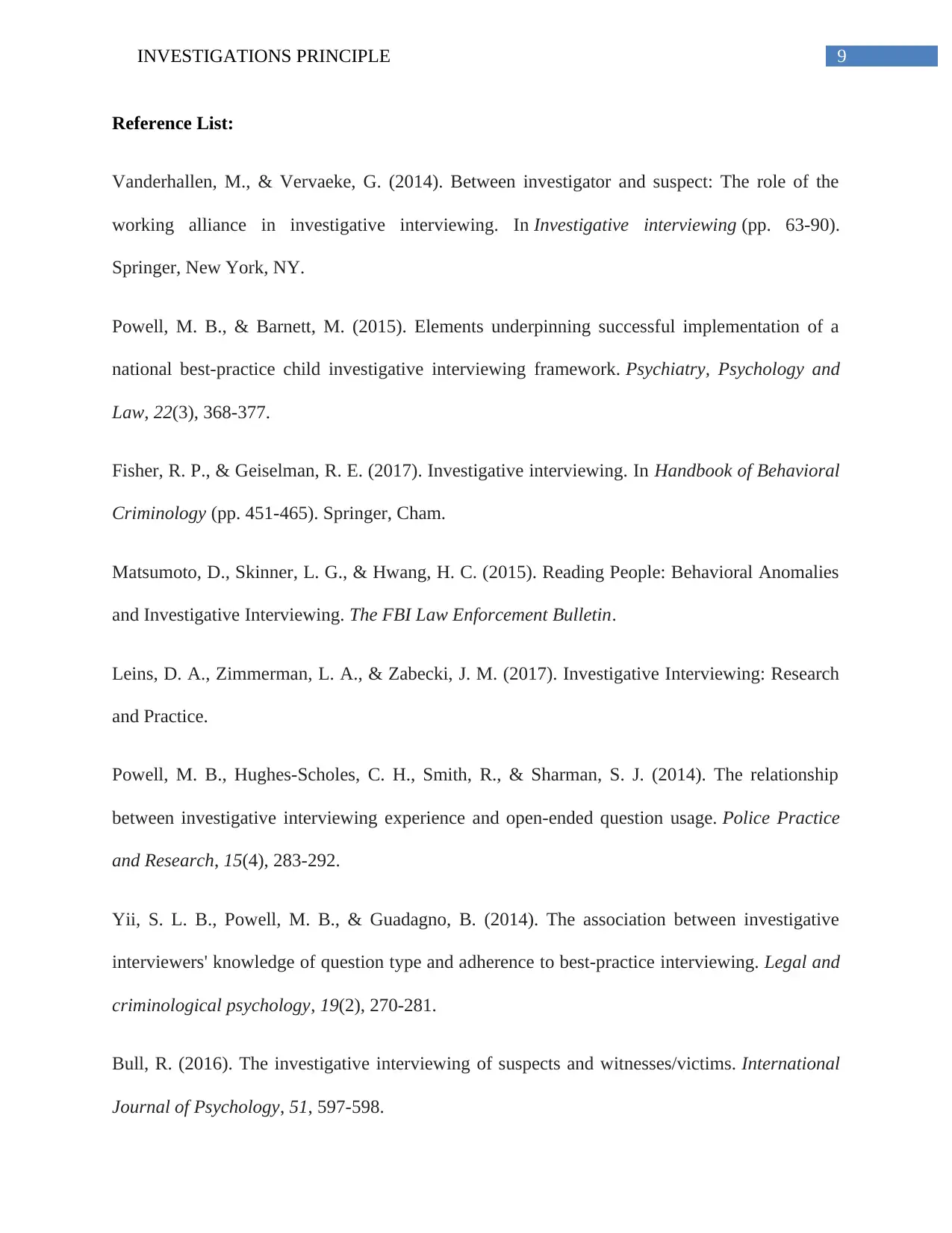
9INVESTIGATIONS PRINCIPLE
Reference List:
Vanderhallen, M., & Vervaeke, G. (2014). Between investigator and suspect: The role of the
working alliance in investigative interviewing. In Investigative interviewing (pp. 63-90).
Springer, New York, NY.
Powell, M. B., & Barnett, M. (2015). Elements underpinning successful implementation of a
national best-practice child investigative interviewing framework. Psychiatry, Psychology and
Law, 22(3), 368-377.
Fisher, R. P., & Geiselman, R. E. (2017). Investigative interviewing. In Handbook of Behavioral
Criminology (pp. 451-465). Springer, Cham.
Matsumoto, D., Skinner, L. G., & Hwang, H. C. (2015). Reading People: Behavioral Anomalies
and Investigative Interviewing. The FBI Law Enforcement Bulletin.
Leins, D. A., Zimmerman, L. A., & Zabecki, J. M. (2017). Investigative Interviewing: Research
and Practice.
Powell, M. B., Hughes-Scholes, C. H., Smith, R., & Sharman, S. J. (2014). The relationship
between investigative interviewing experience and open-ended question usage. Police Practice
and Research, 15(4), 283-292.
Yii, S. L. B., Powell, M. B., & Guadagno, B. (2014). The association between investigative
interviewers' knowledge of question type and adherence to best‐practice interviewing. Legal and
criminological psychology, 19(2), 270-281.
Bull, R. (2016). The investigative interviewing of suspects and witnesses/victims. International
Journal of Psychology, 51, 597-598.
Reference List:
Vanderhallen, M., & Vervaeke, G. (2014). Between investigator and suspect: The role of the
working alliance in investigative interviewing. In Investigative interviewing (pp. 63-90).
Springer, New York, NY.
Powell, M. B., & Barnett, M. (2015). Elements underpinning successful implementation of a
national best-practice child investigative interviewing framework. Psychiatry, Psychology and
Law, 22(3), 368-377.
Fisher, R. P., & Geiselman, R. E. (2017). Investigative interviewing. In Handbook of Behavioral
Criminology (pp. 451-465). Springer, Cham.
Matsumoto, D., Skinner, L. G., & Hwang, H. C. (2015). Reading People: Behavioral Anomalies
and Investigative Interviewing. The FBI Law Enforcement Bulletin.
Leins, D. A., Zimmerman, L. A., & Zabecki, J. M. (2017). Investigative Interviewing: Research
and Practice.
Powell, M. B., Hughes-Scholes, C. H., Smith, R., & Sharman, S. J. (2014). The relationship
between investigative interviewing experience and open-ended question usage. Police Practice
and Research, 15(4), 283-292.
Yii, S. L. B., Powell, M. B., & Guadagno, B. (2014). The association between investigative
interviewers' knowledge of question type and adherence to best‐practice interviewing. Legal and
criminological psychology, 19(2), 270-281.
Bull, R. (2016). The investigative interviewing of suspects and witnesses/victims. International
Journal of Psychology, 51, 597-598.
Secure Best Marks with AI Grader
Need help grading? Try our AI Grader for instant feedback on your assignments.

10INVESTIGATIONS PRINCIPLE
Tunley, M., Whittaker, A., Gee, J., & Button, M. (2015). Investigative Interviewing. The
Accredited Counter Fraud Specialist Handbook, 143-163.
Tunley, M., Whittaker, A., Gee, J., & Button, M. (2015). Investigative Interviewing. The
Accredited Counter Fraud Specialist Handbook, 143-163.
1 out of 11
Related Documents
Your All-in-One AI-Powered Toolkit for Academic Success.
+13062052269
info@desklib.com
Available 24*7 on WhatsApp / Email
![[object Object]](/_next/static/media/star-bottom.7253800d.svg)
Unlock your academic potential
© 2024 | Zucol Services PVT LTD | All rights reserved.





